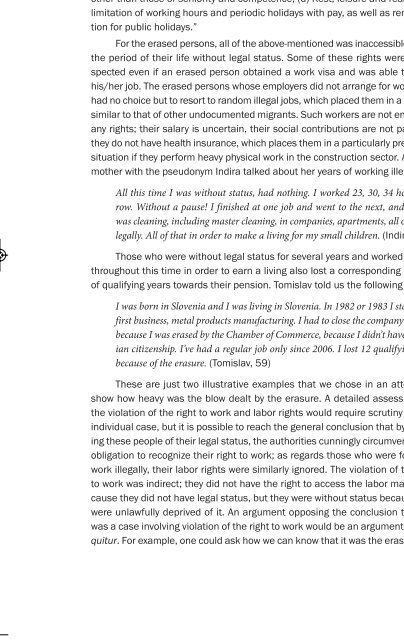The Scars of the Erasure_web
The Scars of the Erasure_web
The Scars of the Erasure_web
- No tags were found...
Create successful ePaper yourself
Turn your PDF publications into a flip-book with our unique Google optimized e-Paper software.
<strong>Erasure</strong>_4a 10.1.11 20:29 Page 126126 THE SCARS OF THE ERASUREmen, with equal pay for equal work; (ii) A decent living for <strong>the</strong>mselves and <strong>the</strong>irfamilies in accordance with <strong>the</strong> provisions <strong>of</strong> <strong>the</strong> present Covenant; (b) Safe andhealthy working conditions; (c) Equal opportunity for everyone to be promotedin his employment to an appropriate higher level, subject to no considerationso<strong>the</strong>r than those <strong>of</strong> seniority and competence; (d) Rest, leisure and reasonablelimitation <strong>of</strong> working hours and periodic holidays with pay, as well as remunerationfor public holidays.”For <strong>the</strong> erased persons, all <strong>of</strong> <strong>the</strong> above-mentioned was inaccessible during<strong>the</strong> period <strong>of</strong> <strong>the</strong>ir life without legal status. Some <strong>of</strong> <strong>the</strong>se rights were not respectedeven if an erased person obtained a work visa and was able to retainhis/her job. <strong>The</strong> erased persons whose employers did not arrange for work visashad no choice but to resort to random illegal jobs, which placed <strong>the</strong>m in a positionsimilar to that <strong>of</strong> o<strong>the</strong>r undocumented migrants. Such workers are not entitled toany rights; <strong>the</strong>ir salary is uncertain, <strong>the</strong>ir social contributions are not paid, and<strong>the</strong>y do not have health insurance, which places <strong>the</strong>m in a particularly precarioussituation if <strong>the</strong>y perform heavy physical work in <strong>the</strong> construction sector. A singlemo<strong>the</strong>rwith <strong>the</strong> pseudonym Indira talked about her years <strong>of</strong> working illegally.All this time I was without status, had nothing. I worked 23, 30, 34 hours in arow. Without a pause! I finished at one job and went to <strong>the</strong> next, and so on. Iwas cleaning, including master cleaning, in companies, apartments, all <strong>of</strong> that illegally.All <strong>of</strong> that in order to make a living for my small children. (Indira, 48)Those who were without legal status for several years and worked illegallythroughout this time in order to earn a living also lost a corresponding number<strong>of</strong> qualifying years towards <strong>the</strong>ir pension. Tomislav told us <strong>the</strong> following story:I was born in Slovenia and I was living in Slovenia. In 1982 or 1983 I started myfirst business, metal products manufacturing. I had to close <strong>the</strong> company in 1995,because I was erased by <strong>the</strong> Chamber <strong>of</strong> Commerce, because I didn’t have Sloveniancitizenship. I’ve had a regular job only since 2006. I lost 12 qualifying yearsbecause <strong>of</strong> <strong>the</strong> erasure. (Tomislav, 59)<strong>The</strong>se are just two illustrative examples that we chose in an attempt toshow how heavy was <strong>the</strong> blow dealt by <strong>the</strong> erasure. A detailed assessment <strong>of</strong><strong>the</strong> violation <strong>of</strong> <strong>the</strong> right to work and labor rights would require scrutiny <strong>of</strong> eachindividual case, but it is possible to reach <strong>the</strong> general conclusion that by depriving<strong>the</strong>se people <strong>of</strong> <strong>the</strong>ir legal status, <strong>the</strong> authorities cunningly circumvented <strong>the</strong>obligation to recognize <strong>the</strong>ir right to work; as regards those who were forced towork illegally, <strong>the</strong>ir labor rights were similarly ignored. <strong>The</strong> violation <strong>of</strong> <strong>the</strong> rightto work was indirect; <strong>the</strong>y did not have <strong>the</strong> right to access <strong>the</strong> labor market because<strong>the</strong>y did not have legal status, but <strong>the</strong>y were without status because <strong>the</strong>ywere unlawfully deprived <strong>of</strong> it. An argument opposing <strong>the</strong> conclusion that thiswas a case involving violation <strong>of</strong> <strong>the</strong> right to work would be an argument non sequitur.For example, one could ask how we can know that it was <strong>the</strong> erasure that


